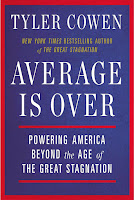 Staff Review by Chris Saliba
Staff Review by Chris SalibaEconomist Tyler Cowen explains how computer technology will create a future of winners and losers, but mostly losers.
Tyler Cowen is professor of economics at George Mason University. He also writes for the New York Times, the Financial Times and the Economist. In Average is Over: Powering America Beyond the Age of the Great Stagnation, Cowen explains how middle-class jobs are being whittled away, pushing many on to lower wage employment. Computer technology, however, is creating highly lucrative opportunities for an intellectual elite.
This book has much to recommend it, but some weaknesses. On the positive side, Average is Over is written in a lucid style that is very accessible. Cowen is an excellent communicator who explains, using many vivid examples, how computers are changing the workplace. He also exhibits a good command of economic data and his argument that the American middle-class is disappearing, as witnessed by the steady erosion of their wages, is convincing.
What disappoints is that Cowen, a chess buff, spends way too much time discussing chess playing computer machines. He does this to draw an analogy between chess, computers and the economy of the future. Cowen’s trying to link chess computing (clearly a personal obsession) to the underlying strength of any future economy isn’t convincingly done.
Another problem is that Cowen likes to tell the reader what new technological gizmos and tools we’ll be using in the future, before they’ve even been invented. This is a book full of predictions. He throws out so many, with such certainty, you wonder how on earth he can possibly know what will be invented in the future. Nor does he take into account possible outside shocks to the economy, like climate change, energy depletion or just general geopolitical conflicts. The future to Cowen looks rosy, no doubt due to the fact he will be one of its technological elite, the 10-15 percent who, according to him, will run the economy.
Some readers may have a few moral problems with Cowen’s predictions for greater economic inequality. His solution for a greater poverty stricken demographic (some 85 percent of the population) is to build big shanty towns to house them. This is not a joke! Cowen asserts that inequality will not cause social unrest, and cites Medieval times as an example. The good news for poor people, writes Cowen, is that there’ll be plenty of cheap entertainment due to the internet. The poor will have low quality food, water and health care, but they will be entertained. Writes Cowen:
We might even look ahead to a time when the cheap or free fun is so plentiful that it will feel a bit like Karl Marx’s communist utopia, albeit brought on by capitalism. That is the real light at the end of the tunnel.
This is an interesting book that did keep me reading quite avidly to the end. Perhaps out of shock, more than anything else. Cowen’s cheerful attitude to the dystopian future he describes is more than a little unsettling. Nonetheless, his grasp of hard economic data can’t be ignored. But if you’re after a more hopeful book on a similar subject, try computer scientist Jaron Lanier’s Who Owns The Future.
Average is Over: Powering America Beyond the Age of The Great Stagnation, by Tyler Cowen. Published by Plume. ISBN: 9780142181119 RRP: $19.99
To sign up for our monthly newsletter, featuring new releases, book reviews and favourite articles from around the web, click here.
No comments:
Post a Comment